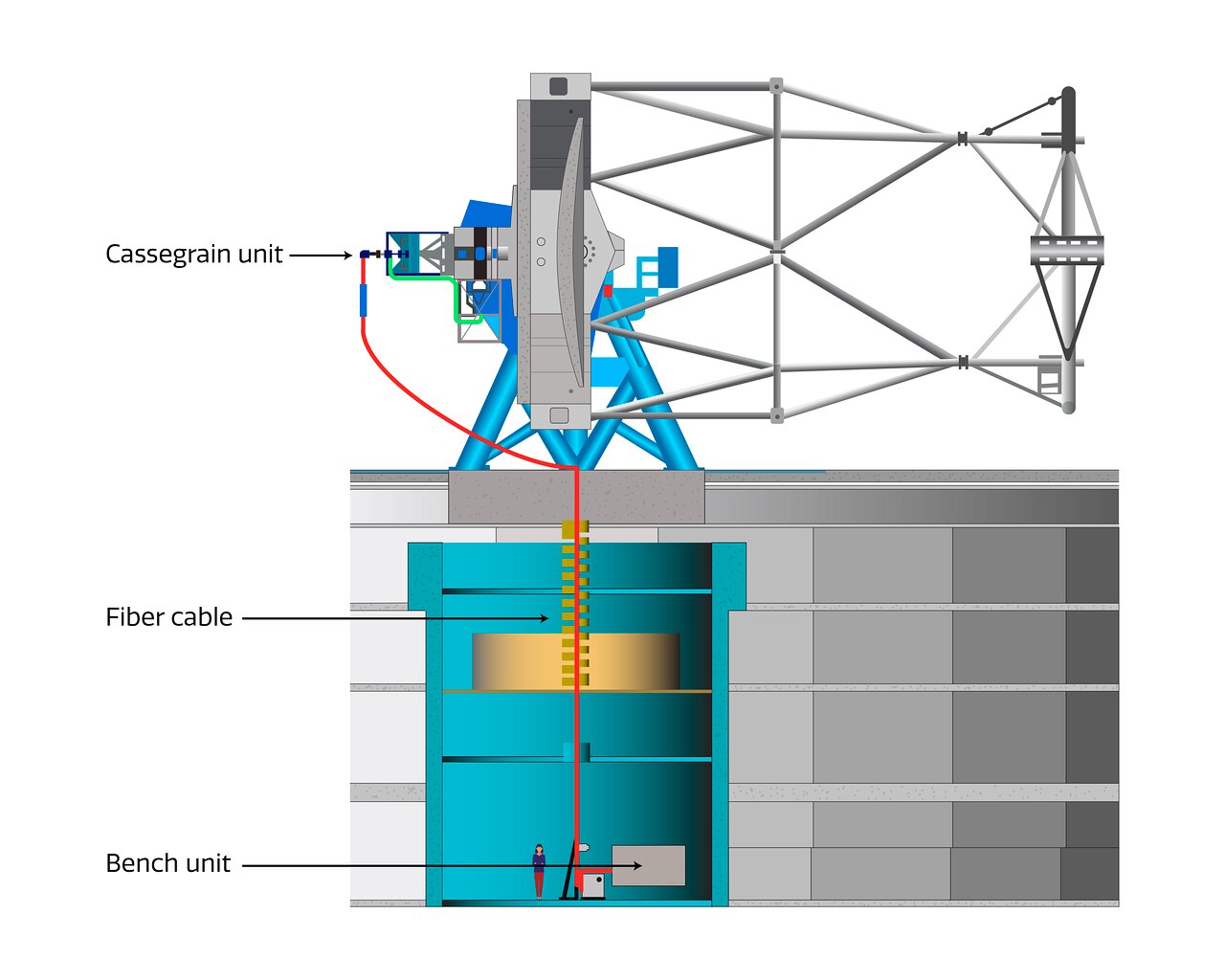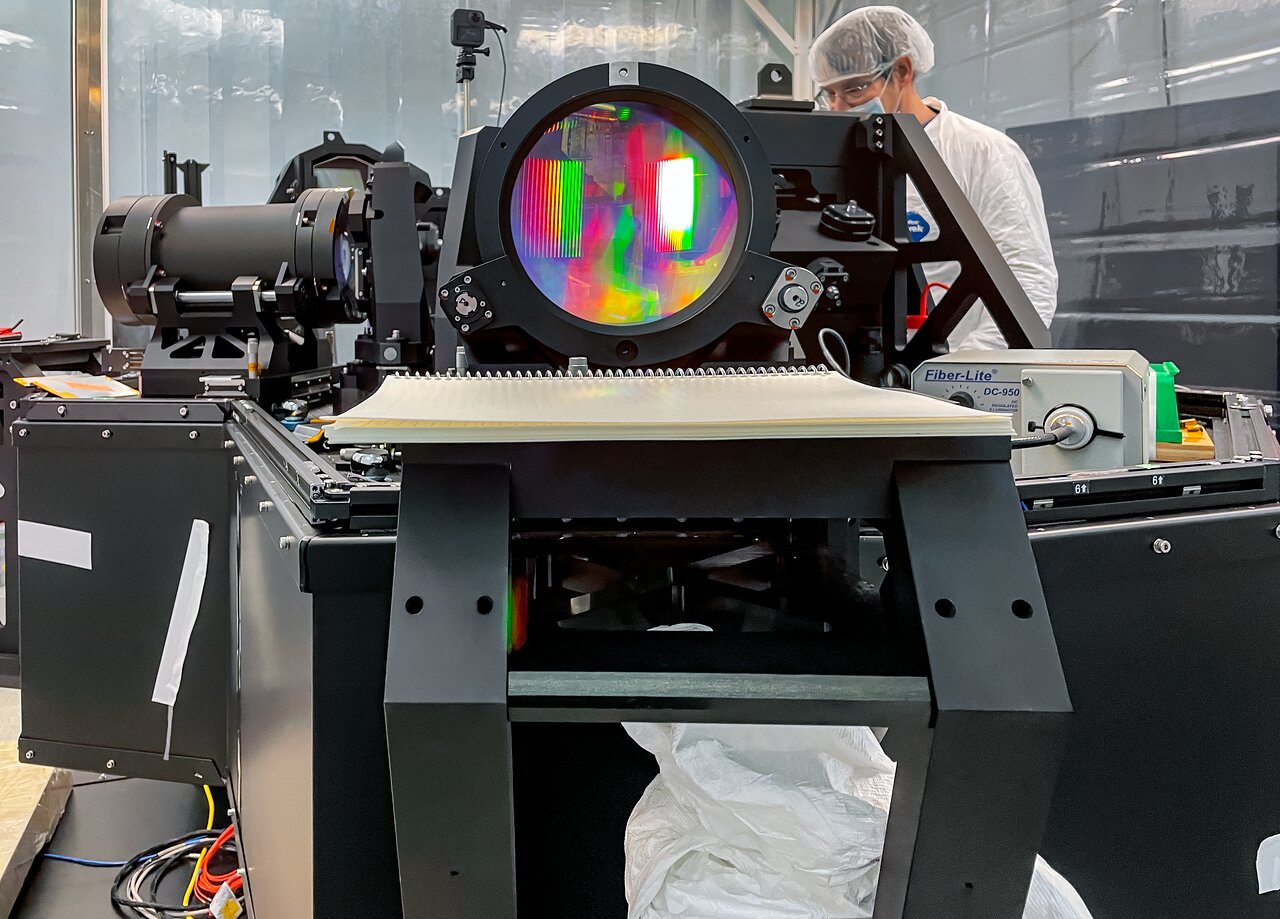Gemini High Resolution Optical SpecTrograph (GHOST)
 GHOST Instrument at the Gemini South telescope.
GHOST Instrument at the Gemini South telescope.
GHOST, the Gemini High-resolution Optical SpecTrograph, is the new Gemini facility instrument that provides world-class, high-resolution spectroscopic capabilities to the Gemini community. GHOST features a wide simultaneous wavelength coverage at high observational efficiency, enabling astronomers to investigate a broad range of science questions from the composition of the first stars to the characterization of exoplanet systems. A data reduction pipeline will be delivered with the instrument. Australian Astronomical Optics at Macquarie University leads the GHOST team, which also includes the National Research Council Herzberg (NRC-H), responsible for the construction of the spectrograph, and the Australian National University (ANU), responsible for the instrument control system and data reduction software.
GHOST consists of three primary components.
1. Cassegrain unit. Mounted on the axial port of Gemini South telescope the Cassegrain unit consists of the Main Structural Plate Assembly, Positioner Frame Assembly, Ballast Frame Assembly and Electronics Cabinet. The Positioner frame is the mounting interface for the Telecentricity Lens, atmospheric dispersion correctors (ADC) assemblies, positioners and integral field units (IFUs). The Ballast Frame is the mount for the ballast weights. These weights are used to provide a total Cassegrain unit assembly mass of 2000 kg. The electronics cabinets contain one of the distributed control systems used to control and monitor the GHOST system actuators and sensors. This distributed control system is based on a combination of standard Ethernet-based LANs and an industrial fieldbus (CAN) with an interface to Ethernet.
 GHOST Cassegrain unit attached to Port 1 of Gemini South telescope.
GHOST Cassegrain unit attached to Port 1 of Gemini South telescope.
2. Spectrograph bench. Located in the pier telescope laboratory, the spectrograph bench is isolated for image and wavelength stability. GHOST is an echelle spectrograph based on a two-arm asymmetric white-pupil design with a Volume Phase Holographic (VPH) grating for cross-dispersion and two detectors, one at the end of each arm: a 4k x 4k blue detector and 6k x 6k red detector. A third detector (slit unit camera) provides for object acquisition and active monitoring of the slit illumination. The bench uses active thermal stabilization to help provide the image and wavelength stability necessary for operational efficiency and radial velocity precision.
3. Fiber cable. The 25-meter-long fiber cable transmits the light from the Cassegrain unit to the spectrograph bench.
GHOST provides simultaneous wavelength coverage from 363 nm to 950 nm. It has two selectable spectral resolution modes: a standard-resolution mode with resolving power R ~ 55,000 and a high-resolution mode with R ~ 80,000. The instrument will obtain a limiting magnitude of 17.5 at 450 nm.
GHOST will enable astronomers to investigate a broad range of science goals, from the composition of the first stars to the characterization of exoplanetary systems. GHOST will also provide crucial follow-up of interesting targets emerging from many ongoing and future surveys, such as Vera C. Rubin Observatory’s Legacy Survey of Space and Time, SkyMapper and GAIA.
Quick Facts
|
|
Gemini High Resolution Optical SpecTrograph (GHOST) The technical information for astronomical observations is available at the Gemini Observatory webpage |
|
|
Site |
Cerro Pachón |
|
Telescope |
Gemini South Telescope |
|
Type |
Spectrograph |
|
Wavelength range |
360 – 1000 nm |
|
Spatial resolution: |
0.4 arcsec/pixel |
|
Detector Number |
2 science, 1 slit camera, 1 guider fiber camera |
|
Detectors size |
4k x 4k blue camera and 6k x 6k red camera |
|
Spectral resolution: |
R ~ 55,000 Standard resolution mode R ~ 80,000 High-resolution mode |
|
Field of view |
7.5 arcmin / slit 1.2 arcsec |
|
Filters |
none |
|
First Light Date |
June 2022 |
|
Science Goals |
Characterization of exoplanet systems Extremely metal-poor stars in the Milky Way and nearby dwarf satellites Follow-up of GAIA targets Radial velocity confirmation of transiting planet candidates, particularly from TESS Abundance studies of extragalactic globular clusters |
|
Images taken with the instruments |
Link |
|
Images of the instrument |
Link |
|
Videos of the Instrument |
Link |
|
Press releases with the instrument |
GHOST |










